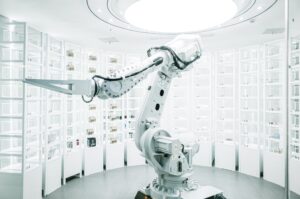
Move over, traditional medicine! There’s a new kid on the block, and it goes by the name of AI technology. That’s right, the same tech that powers your Netflix recommendations and self-driving cars is now revolutionizing the healthcare industry. With its ability to analyze vast amounts of data and learn from it, AI technology in healthcare is unlocking a world of potential for improving patient outcomes, increasing efficiency, and reducing costs.
But what exactly is AI technology, and how is it being applied in the healthcare industry? AI, or artificial intelligence, refers to technology that can learn from data and make decisions independently. In healthcare, AI algorithms can analyze patient data, medical records, and even genomic data to assist with medical diagnosis, treatment planning, and patient care.
The Power of AI in Healthcare
Artificial intelligence (AI) is revolutionizing the healthcare industry, from medical diagnosis to patient care. With its ability to process vast amounts of data and learn from it, AI technology is transforming how healthcare professionals deliver services and improving patient outcomes. Let’s explore some of the incredible applications of AI in healthcare.
The AI Healthcare Solutions
Medical diagnosis is one area where AI technology is making significant progress. AI-powered algorithms can analyze patient data, such as medical images, to detect patterns and identify potential health issues. This allows for more accurate and timely diagnoses, leading to better and more personalized treatment plans.
Another area where AI is making a difference is in treatment planning. By analyzing patient data, AI can predict how patients will respond to various treatment options and suggest the best course of action for each individual. This can lead to more effective and efficient treatment, minimizing the risk of negative side effects.
- Did you know that AI is also being used to improve patient care? AI-powered systems can monitor patient data in real-time, alerting healthcare professionals to potential issues before they become critical. This leads to faster response times and better patient outcomes.
- AI is also being used to reduce healthcare costs. By automating routine tasks and streamlining processes, healthcare organizations can save time and money, allowing them to focus on providing the highest quality care possible.
- And the benefits of AI in healthcare don’t stop there. With its ability to process large amounts of data quickly and accurately, AI is also being used to develop new treatments, predict disease outbreaks, and even personalize healthcare services based on a patient’s unique needs.
As you can see, the power of AI in healthcare is truly remarkable. From improving diagnosis accuracy to reducing healthcare costs, AI technology is transforming the healthcare industry in ways that were once thought impossible.
The Impact of AI in Healthcare: Advancements and Challenges
AI technology has brought numerous advancements to the healthcare industry, from improving diagnosis accuracy to optimizing treatment plans. However, with these breakthroughs come new challenges.
The Advancements
The integration of AI healthcare systems has led to improved patient outcomes and increased efficiency in healthcare facilities. AI-powered medical diagnosis tools are more accurate than traditional methods, providing physicians with more precise information to develop effective treatment plans.
Moreover, AI has enabled the development of personalized treatment plans based on an individual’s unique medical history, genetics, and lifestyle. This approach has led to better patient outcomes and reduced healthcare costs.
AI is also being used in healthcare to monitor patient health remotely, reducing the need for hospitalization. This technology allows physicians to analyze patient data in real-time, enabling early detection of potential health issues.
The Challenges of AI Technology in Healthcare
While the benefits of AI in healthcare are undeniable, its implementation poses several challenges, particularly regarding patient privacy and security.
AI healthcare systems must adhere to strict privacy regulations to protect patient data from cyber threats and unauthorized access. There are also concerns about the potential for AI to perpetuate biases in healthcare, as algorithms may reflect the societal or cultural biases of their creators.
Furthermore, the high cost of implementing AI technology in healthcare can create inequalities in access to care, with smaller healthcare providers potentially being unable to afford the latest AI-powered solutions.
Despite these challenges, the potential benefits of AI in healthcare make it a technology that cannot be ignored. As the industry continues to evolve, it is essential to address these challenges in a proactive manner to ensure that all patients can benefit from the advancements AI brings.
The Future of AI Technology in Healthcare
AI technology has the potential to revolutionize healthcare by improving diagnosis and treatment accuracy, streamlining administrative tasks, and enhancing overall patient care. In the future, we can expect to see even more advancements as AI continues to evolve and expand its capabilities.
Personalized medicine is one area where AI is set to make a significant impact. By analyzing vast amounts of patient data and genetic information, AI-powered systems can create tailored treatment plans that are specific to each patient’s unique needs. This could lead to faster and more effective treatments, ultimately improving patient outcomes.
Another exciting prospect is the use of AI in medical research. By analyzing large datasets, AI can identify patterns and relationships that may not be immediately apparent to human researchers. This could help researchers develop new treatments and cures for diseases that have long been considered incurable.
However, the implementation of AI in healthcare also presents some challenges. One of the main concerns is ensuring patient privacy and security. As AI healthcare systems gather and analyze sensitive patient data, it’s crucial that appropriate measures are taken to protect that information.
Despite these challenges, the benefits of AI in healthcare are clear. By harnessing the power of this technology, we can improve patient outcomes, increase efficiency, and drive truly transformative innovation in the healthcare industry.
As the use of AI in healthcare continues to grow, we can expect to see more and more AI-powered solutions that address the unique challenges and opportunities of the industry. It’s an exciting time to be working in healthcare, and AI technology is sure to play a crucial role in shaping the future of the field.
The Real-Life Impact of AI Technology in Healthcare: Case Studies
While the potential of AI technology in healthcare is exciting, the proof of its success lies in real-life applications. Here are some case studies of AI-powered healthcare solutions making a significant impact:
1. Early Detection of Heart Disease
In a study, an AI algorithm was developed to detect heart disease using retinal images. The AI diagnosis was found to be just as accurate as a team of specialized cardiologists, demonstrating the potential of AI to improve early detection and diagnosis of diseases.
2. Personalized Cancer Treatment Plans
AI technology is being used to develop personalized treatment plans for cancer patients. A Cancer Center developed an AI-powered system that recommends treatment options based on patient data and medical knowledge. This technology allows for more precise and individualized treatment plans, leading to better patient outcomes.
3. Improved Radiology Diagnosis
AI technology is enhancing radiology diagnoses by providing more accurate and efficient readings. In a study, a deep learning algorithm was used to diagnose pneumonia from chest X-rays. The AI diagnosis had a 92% accuracy rate, compared to a 90% accuracy rate for a team of radiologists, highlighting the potential for AI to improve medical diagnoses.
4. Predictive Analytics for Hospital Readmissions
AI technology is being used to predict which patients are at risk for hospital readmission. In a study, a predictive algorithm that analyzed patient data was able to predict readmissions within 30 days of discharge with 80% accuracy. This technology can help healthcare providers intervene early and prevent unnecessary hospital stays, improving patient outcomes and reducing healthcare costs.
5. Remote Patient Monitoring
AI is enabling remote patient monitoring, allowing for a more personalized and proactive approach to healthcare. In a collaboration, they created an AI-powered system that analyzes patient data and provides personalized insights and recommendations to clinicians. This technology has the potential to improve patient outcomes and reduce healthcare costs by catching issues early and avoiding hospitalizations.
These case studies demonstrate the transformative potential of AI technology in healthcare. As AI continues to advance, we can expect to see even more breakthroughs and innovations in the field.
The Frequently Asked Questions about AI Technology in Healthcare
So, you want to know more about AI in healthcare? That’s great, because we’ve got some answers for you. Here are some of the most commonly asked questions about AI technology in the healthcare industry:
What is AI technology, and how is it being used in healthcare?
AI technology is a form of computerized intelligence that allows machines to learn from data and then make predictions or decisions based on that learning. In healthcare, AI is used for medical diagnosis, treatment planning, and patient care. It helps doctors and other healthcare professionals make more accurate decisions based on vast amounts of clinical data.
What are the potential risks associated with AI technology in the healthcare industry?
As with any new technology, there are always potential risks to consider. These include issues around data privacy and security, bias in the algorithms used, and the risk of over-reliance on AI technology to the detriment of human expertise. However, these risks can be mitigated through careful implementation and ongoing monitoring of AI healthcare systems.
Is AI technology effective for medical diagnosis?
Yes, AI technology has shown promising results in improving the accuracy of medical diagnosis. It can analyze vast amounts of medical data and help to identify patterns that might otherwise go unnoticed. However, AI should be seen as a tool to assist doctors in their diagnosis, rather than a replacement for human expertise.
What are the limitations of AI technology in healthcare?
One of the limitations of AI technology in healthcare is the need for vast amounts of data to train the algorithms effectively. This can be particularly challenging in some areas of healthcare, such as rare diseases. Additionally, there is the risk of bias in the algorithms used, and the need for ongoing monitoring and refinement of AI healthcare systems.
Are there any successful real-life case studies of AI-powered solutions in healthcare?
Yes, there have been many successful real-life case studies where AI technology has been used to improve patient outcomes, reduce costs, and enhance overall healthcare quality. Some examples include the use of AI for early warning systems in hospitals, and the development of AI-powered diagnostic tools to help doctors identify conditions such as skin cancer more accurately.
Can AI technology personalized treatment plans for patients?
Yes, AI technology has the potential to help doctors develop personalized treatment plans for patients based on their unique medical history and circumstances. By analyzing vast amounts of medical data, AI can help to identify the most effective treatments for individual patients, leading to better health outcomes and quality of life.
So, there you have it, a quick rundown of some of the most frequently asked questions about AI technology in healthcare. Hopefully, this has helped to shed some light on this exciting and rapidly evolving field.






